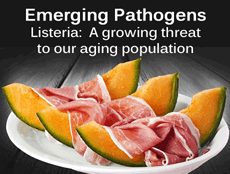Listeria bacteria can be found in soil, water and animal feces. Humans typically are infected by consuming:
Raw vegetables that have been contaminated from the soil or from contaminated manure used as fertilizer.
Infected meat.
Unpasteurized milk or foods made with unpasteurized milk.
Certain processed foods — such as soft cheeses, hot dogs and deli meats that have been contaminated after processing.
Eric and Ryan Jensen recently walked out of court as free men. They are charged with knowing, or should have known that their cantaloupes were contaminated with listeria. This issue in 2011 killed 33 people. What jerks these Jensens are!
From August through October 2011, 147 people in 28 states were infected with Listeria monocytogenes after eating cantaloupe from Jensen Farms in Colorado. There were 33 deaths, and one pregnant women had a miscarriage as a result, making it one of the deadliest outbreak of foodborne illness in the U.S. in recent years.
Apart from some diarrhea or minor gastrointestinal problems, most people don’t get sick when they’re exposed to Listeria. But, if the pathogen gets into their bloodstream, it can cause listeriosis, a disease that kills one out of every five victims. Because of these odds, Listeria has the highest mortality rate of foodborne pathogens.
Groups most at risk for Listeria infections are older adults, pregnant women and people with an underlying medical conditions such as cancer liver or kidney disease, diabetes or HIV/AIDS.
People 65 and older are four times more likely to get sick from Listeria poisoning than the general population, and pregnant women – who may not develop listeriosis themselves but whose babies could be threatened – are 10 times more likely.
Foods that typically cause Listeria outbreaks are Mexican-style soft cheeses made with unpasteurized milk, deli meats, and hot dogs. Produce was not often identified as a source in the past, but sprouts caused an outbreak in 2009, and pre-cut celery caused an outbreak in 2010.
In addition to its high mortality rate, Listeria is an unusual foodborne pathogen because it can survive and multiply at refrigerator temperatures. In order to avoid Listeria, CDC recommends that high-risk consumers heat hot dogs, lunch meats and cold cuts to an internal temperature of 165 degrees F and avoid products with unpasteurized milk, refrigerated paté or meal spreads, and uncooked smoked seafood.
When it comes to melon safety, consumers and food preparers should wash their hands before and after handling a whole melon, scrub the outside of melons under running water and dry them with a clean cloth or paper towel before cutting, and then promptly consume or refrigerate cut melon and keep it for no more than a week.
